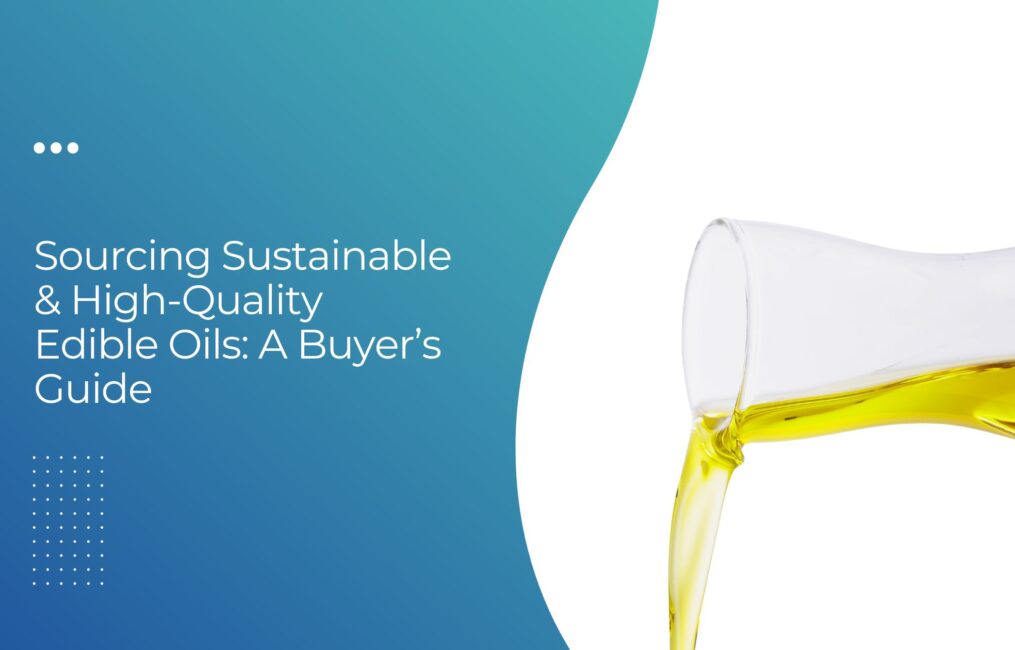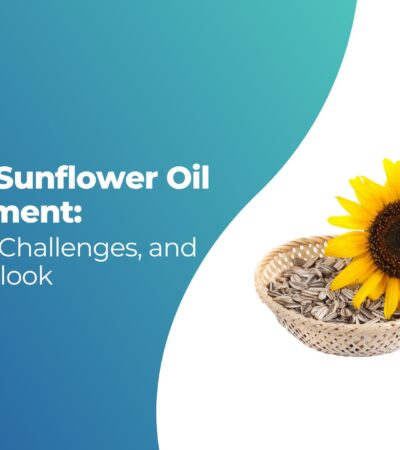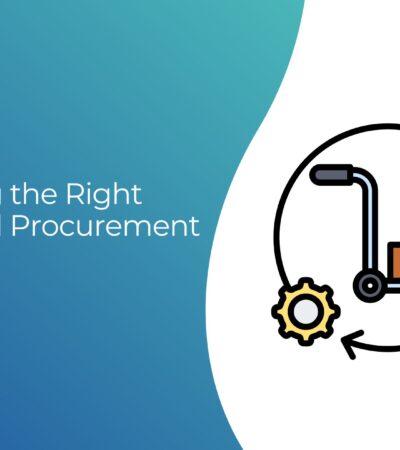Sourcing Sustainable & High-Quality Edible Oils: A Buyer’s Guide

Edible oils are a vital part of our daily lives. From preparing food at home to large-scale food manufacturing, oils are everywhere. They’re also essential in industries such as cosmetics, pharmaceuticals, and even biodiesel. Because of this, Edible Oil Procurement has become a key business function for companies across the globe.
But procurement today is not only about buying the right oil at the right price. Businesses are now expected to balance three critical factors: quality, cost, and sustainability. With growing consumer awareness and stricter global standards, sourcing edible oils responsibly has become more important than ever.
In this guide, we’ll explore how companies can source sustainable and high-quality edible oils, understand market trends, deal with challenges, and apply best practices for long-term success.
The Global Edible Oil Landscape
The edible oil market is massive and continues to grow. Oils like Refined Sunflower Oil, Refined Soybean Oil, and Refined Corn Oil are widely consumed worldwide, while palm oil remains one of the most traded oils in the global market.
Demand and growth
With rising populations, urbanization, and a shift toward packaged foods, demand for refined and healthier oils is increasing. At the same time, sustainability is influencing purchasing decisions, as more consumers want oils produced responsibly.
Leading producers and consumers
- Palm oil: Mainly from Indonesia and Malaysia.
- Soybean oil: Produced by the US, Brazil, and Argentina.
- Sunflower oil: Primarily from Ukraine and Russia.
- Corn oil: Widely produced in North and South America.
On the demand side, India and China are among the largest edible oil consumers. India imports around 14–15 million tonnes each year to meet its domestic needs.
Market influences
Global edible oil procurement is shaped by many factors:
- Weather conditions that affect oilseed production.
- Currency fluctuations that impact import costs.
- Crude oil prices, since some edible oils are used in biodiesel.
- Geopolitical issues, such as trade restrictions or conflicts.
For example, the Russia–Ukraine conflict disrupted sunflower oil supplies, forcing many businesses to shift toward alternatives like soybean and corn oil. This highlights why procurement teams need a global perspective when making decisions.
Key Factors in Sourcing High-Quality and Sustainable Oils
When sourcing edible oils, businesses must look beyond just price. Here are some of the main factors that matter.
1. Quality standards and certifications
Food safety is non-negotiable. Oils must meet national and international standards. Reputable suppliers will provide certifications like:
- FSSAI (Food Safety and Standards Authority of India)
- AGMARK (for agricultural product quality in India)
- ISO and HACCP (recognized globally)
For oils such as sunflower, corn, and soybean, third-party lab testing should be standard practice. This ensures purity and prevents adulteration.
2. Price stability and procurement planning
Edible oil prices fluctuate regularly due to supply and demand shifts. For instance, reduced soybean yields in Brazil can push up Refined Soybean Oil prices globally. Procurement managers must track market reports and plan purchases smartly to avoid sudden price hikes.
3. Sustainability commitments
Sustainability is no longer optional. Oils must be sourced in ways that respect the environment and communities. Palm oil, in particular, has faced criticism over deforestation. Today, buyers demand oils that are traceable and come with eco-friendly certifications. Even alternatives like Refined Sunflower Oil and Refined Corn Oil are increasingly expected to meet sustainability standards.
4. Logistics and packaging
Since oils are usually procured in bulk, shipping and packaging are critical. Whether it’s in drums, flexitanks, or tankers, the method impacts both cost and quality preservation. Efficient logistics help avoid losses and delays.
5. Supplier reliability
Reliable suppliers are partners, not just vendors. They ensure consistent quality, transparent practices, and flexible contracts. For insights on what makes a supplier trustworthy, see our blog on Choosing the Right Edible Oil Procurement Partner.
Procurement Models and Approaches
Every business chooses its procurement strategy based on its size, budget, and demand. Here are some common models:
Direct sourcing vs. distributors
- Direct sourcing: Buying directly from refiners or manufacturers. This usually means lower prices and more control but requires handling logistics and larger quantities.
- Distributors: Offer smaller lots and faster turnaround but often at slightly higher costs.
Bulk procurement advantages
For food manufacturers, buying in bulk is often the most cost-effective option. Ordering large volumes of oils such as Refined Sunflower Oil ensures steady supply and better negotiation terms.
Long-term contracts vs. spot buying
- Long-term contracts: Lock in price and supply for 6–12 months, reducing the risk of sudden market fluctuations.
- Spot buying: Suitable for smaller players, but risky in volatile markets.
Domestic vs. international sourcing
- Domestic sourcing: Faster and easier to manage compliance but may be limited in variety.
- International sourcing: Provides access to global options at competitive pricing, though it comes with customs and freight risks.
Risk management strategies
To protect against disruptions, procurement teams often:
- Diversify suppliers across regions.
- Use futures contracts to hedge price risks.
- Monitor global commodity reports to plan purchases.
Challenges in Sourcing Edible Oils
Procurement managers face several challenges that can disrupt business operations.
1. Price volatility
Oils are tied to agricultural yields and global energy markets. A surge in biofuel demand can drive up prices of oils like soybean or corn overnight.
2. Adulteration risks
Low-quality or adulterated oils can harm both consumers and brand reputation. Without independent testing, businesses risk compliance violations.
3. Global supply chain disruptions
Events like the COVID-19 pandemic or port blockages can delay shipments. Reliance on single suppliers or routes increases vulnerability.
4. Compliance complexities
International procurement comes with documents, duties, and trade laws. Even minor errors can cause shipment delays or fines.
5. Growing sustainability pressure
Buyers worldwide expect traceable, environmentally friendly oils. Companies not aligning with this shift risk losing global opportunities.
For a deeper dive, see our post on Edible Oil Procurement Challenges.
Best Practices for Reliable and Cost-Effective Sourcing
Procurement done well can save money and build long-term business stability. Here’s how businesses can improve their sourcing approach:
Build strong supplier partnerships
Treat suppliers as partners, not just vendors. Strong relationships often mean priority allocation during shortages, better terms, and transparency.
Use digital procurement tools
Technology makes it easier to track global oil prices, manage contracts, and forecast demand accurately.
Conduct regular quality checks
Independent lab testing ensures oils like Refined Corn Oil meet safety and purity standards.
Optimize logistics
Choosing efficient packaging and shipping methods—such as flexitanks—can cut costs while protecting oil quality during transport.
Negotiate smartly
Bulk buyers have leverage. Procurement teams should negotiate for favorable terms on pricing, delivery schedules, and payment.
Case Study: Bulk Sunflower Oil Procurement
To better understand what successful procurement looks like, let’s take an example of a food manufacturing company sourcing Refined Sunflower Oil in bulk.
The challenge
The company was struggling with fluctuating prices due to the Ukraine conflict, which disrupted global sunflower oil supply. Their procurement team also faced delays in delivery and growing concerns about whether the oil met international sustainability standards.
The approach
- Diversification of supply sources: Instead of depending only on Ukraine, they partnered with suppliers in Argentina and Turkey.
- Quality assurance: Every batch was tested by a third-party lab to ensure it met both FSSAI and EU standards.
- Sustainability checks: Suppliers were required to provide traceability documents to confirm the oil was responsibly sourced.
- Long-term contracts: The company negotiated a 9-month contract to lock in pricing and minimize volatility risks.
The outcome
- Stable and reliable supply of sunflower oil despite global market disruptions.
- Better cost management by avoiding sudden price spikes.
- Stronger brand reputation for sourcing oils responsibly.
This example shows how the right procurement strategy can help businesses secure both quality and sustainability while controlling costs.
The Future of Edible Oil Procurement
The edible oil industry is evolving rapidly. Companies that stay ahead of the curve will be best positioned to compete in global markets. Here are some emerging trends:
1. Growing demand for healthier oils
Consumers are shifting toward oils with better nutritional profiles. For example:
- Refined Corn Oil, known for its cholesterol-lowering properties.
- Refined Soybean Oil, valued for its versatility in food processing.
- Refined Sunflower Oil, rich in Vitamin E and preferred for cooking.
Procurement teams must align their sourcing with these consumer preferences.
2. Digital procurement platforms
The future is digital. Tools powered by AI and blockchain are already being used to:
- Track global edible oil prices in real time.
- Improve traceability and transparency in the supply chain.
- Simplify contract management and compliance.
3. Sustainability as a core requirement
Governments and consumers are demanding oils that are produced responsibly. Expect certifications like RSPO (for palm oil) or eco-labels for sunflower and soybean oils to become a procurement standard.
4. Supply chain localization
To avoid disruptions, many companies are exploring regional suppliers rather than depending heavily on one global source. This trend is expected to grow in the coming years.
5. Integrated logistics solutions
Procurement will go hand-in-hand with logistics planning. Bulk buyers will increasingly choose suppliers who offer integrated solutions — from refining to packaging and shipping.
Conclusion
Edible oil procurement is more than just purchasing a commodity — it’s about building a resilient, cost-effective, and sustainable supply chain. Companies must strike the right balance between quality, price, and sustainability to meet both consumer expectations and industry standards.
Whether it’s Refined Corn Oil, Refined Sunflower Oil, or Refined Soybean Oil, businesses should prioritize trusted suppliers, smart procurement models, and continuous quality checks.
The future belongs to businesses that adapt to changing consumer preferences, embrace sustainability, and build strong supplier partnerships.
FAQs on Edible Oil Procurement
Q1. What is the most important factor in edible oil procurement?
The most important factor is ensuring quality and safety. Certifications, third-party lab tests, and traceable supply chains help guarantee that oils are pure and compliant with food safety standards.
Q2. How can businesses protect themselves from edible oil price volatility?
Companies can use long-term contracts, diversify suppliers across different regions, and monitor global market trends to reduce risks caused by sudden price changes.
Q3. Why is sustainability important in edible oil sourcing?
Sustainable sourcing ensures that oils are produced without harming the environment or local communities. It also improves brand reputation and meets the growing demand from conscious consumers.
Q4. What are the advantages of bulk procurement of refined oils?
Bulk procurement offers lower costs per unit, stable supply, and better negotiation power. It’s especially beneficial for manufacturers and food processors with high-volume requirements.
Q5. Which oils are most commonly procured in bulk?
The most common oils include Refined Sunflower Oil, Refined Soybean Oil, and Refined Corn Oil, as they are widely used in food manufacturing and household consumption.
Q6. Should companies prefer domestic or international edible oil suppliers?
It depends on business needs. Domestic suppliers offer faster deliveries and simpler compliance, while international suppliers provide variety and often more competitive pricing. Many companies use a mix of both to reduce risks.
Q7. How can small businesses ensure quality while sourcing oils internationally?
Smaller buyers should work with distributors who can provide smaller lots, insist on supplier certifications, and request sample testing before committing to long-term contracts.





